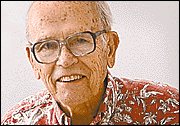Advertisement - Click to support our sponsors.


Hawaii’s World
THE way things are going in Hawaii and national polls, the year 2000 could be a repeat of 1960, when the new state of Hawaii almost tipped the balance in the presidential electoral college. Hawaii’s role in
the 1960 electionWe have four electoral votes now. We had only three then. But we came shockingly close in 1960 to being the decisive state on whether the next president would be John Kennedy or Richard Nixon.
In August that year Vice President Nixon seemed to have a lock on the presidency. Then came our first televised presidential debates and Senator Kennedy narrowly won the election on the strength of his better TV appearance.
The dynamics involving Hawaii were particularly interesting. Nixon, after he was nominated by the Republicans, set a "New Frontiers" theme for his campaign. He dramatized it by opening his campaign in Hawaii and then Alaska. We were the new 50th and 49th states, signed into the union the year before.
Nixon rode through Honolulu in an open car with cheering thousands greeting him. He would have carried the state easily that day. No presidential candidate ever campaigned here before and none has since. Kennedy sent Lyndon Johnson, his vice-presidential choice, and his then-little-known youngest brother, Ted.
In our pre-statehood elections in 1959 we elected one Republican to the U.S. Senate, Hiram L. Fong, and one Democrat, Oren Long. We also elected a Republican governor, William F. Quinn. Our then-single seat in the House of Representatives went to a young Democratic war veteran, Daniel K. Inouye. Fong and Inouye were the first Asians ever to serve in Congress.
Until the debates, Nixon seemed a safe bet to carry both the nation and Hawaii. Even the ILWU endorsed him. As it turned out, however, he won Hawaii by only 141 votes in the first count, then lost it by 115 votes in a recount that dragged through December. It was the first statewide recount of any state since the Civil War and the only one to change a posted result. Dishonesty was never alleged.
With the recount still dragging on, a team of three GOP presidential electors went to Iolani Palace Dec. 19 and voted for Nixon. But three Democratic electors followed them into the booth (which someone had proposed carting off before they could) and voted for Kennedy.
ON Jan. 6, 1961, hours before the U.S. Senate officially tallied the electoral votes, it received a message from Hawaii's Republican governor, Quinn, saying the three Kennedy votes from Hawaii should be accepted. Vice President Nixon presided over the count and affirmed this. There would have been a floor fight if he hadn't.
Immediately after the national voting in November, Illinois teetered between Nixon and Kennedy in a slow count. It finally went to Kennedy and cinched his election. Otherwise tiny Hawaii's three votes could have been decisive.
In Hawaii this year there seems to be a first-ever chance for a Republican presidential candidate to carry the state on his first try. Nixon and Ronald Reagan carried Hawaii in their re-election sweeps but not on their first term tries.
Hawaii clearly is not as locked up for Democrats on the national scene as we have been in our local governor and legislative races. We sent Republican Fong to the Senate repeatedly and elected Republican Patricia Saiki to the lower house. Keep tuned because the Hawaii GOP has some renewed vitality under Linda Lingle, now party chairwoman. She only narrowly lost for governor two years ago.
A.A. Smyser is the contributing editor
and former editor of the the Star-Bulletin
His column runs Tuesday and Thursday.